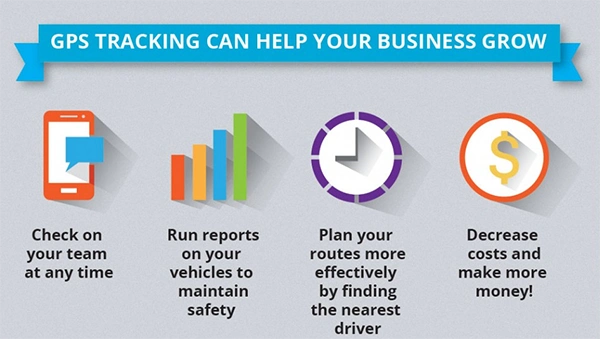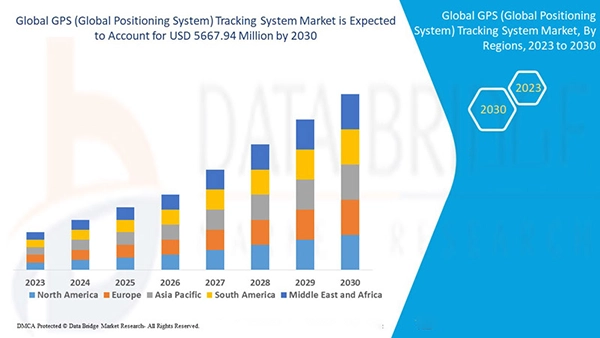Imagine that you have ordered something online and your delivery is running late, causing a little frustration here and there. However, by using advanced GPS tracking technology, businesses can enhance the level of visibility a customer gets while maintaining a positive brand reputation in the market.
This advanced GPS technology goes a long way in optimizing business operations, cutting down operational costs and improving customer satisfaction, which probably are the major factors contributing to the brand’s reputation.
So, this read will be having a deep dive into how integrating advanced GPS tracking can help businesses grow in this competitive market.
Let’s start!

GPS Tracking can help business improve their overall workflow efficiency in several ways, including,
For all the businesses related to the fleet, advanced GPS tracking can be a major game changer in improving their operational management. This can help businesses monitor the vehicle’s movement in real-time and also help suggest a better route to reduce the time and fuel consumption.
Tracking is always a safe and secure option to track all of your business essentials, be it your employees or the company assets. Not only does this help businesses monitor the project process in real time but also allows them to deter theft by providing a means to track stolen assets. Additionally, the technology also helps in quickly locating individuals in emergencies and sends immediate assistance.
GPS tracking provides enhanced visibility into the employee’s activity, which means that businesses can now hold employees accountable for their doings. It monitors an employee’s location along with the time they have spent on different websites. This allows businesses to make sure that their employees are efficiently fulfilling their duties.
Another major advantage of GPS tracking is its ability to produce a wealth of data that can be further analyzed to make better decisions. It provides insights into vehicle usage and helps determine the most efficient routes for the project. Moreover, it also helps in identifying the underutilized assets and all the major areas of improvement to optimize an operation.
By selecting the perfect route for the operations, businesses can significantly cut down the time and resource consumption in the process. This clear-cut elimination of wasteful practices often leads to higher profit margins, while also allowing businesses to determine the overtime pay for the employees.
The last and probably the most known ability of GPS tracking is that it helps ensure everyone is on the same page by streamlining workflow communication. By effectively communicating with the drivers, businesses can not only reduce the major delays in the process but also improve the overall operational efficiency.
Here’s A Fun Fact
Do you know that GPS has a military origin? Well, it was developed by the U.S. military during the Cold War period to improve their targeting accuracy.
To successfully implement GPS tracking in your business, consider the following steps:
The first step concludes by identifying your business requirements. This includes identifying the primary goal for tracking, whether it is for fleet management, employee safety or even to monitor asset utilization.
Before opting for a tracking system, make sure to check the complete product list as there are different GPS tracking systems available. Also, try considering their integration with existing businesses to ensure that their solutions align with your requirements and budget.
The installation process may differ from the tracking system you choose, but generally, it is a hardwired and plug-based installation. This is the most crucial aspect of the process, as all of the further development depends on it. And, this is why it is often advised to hire a professional to properly set up the GPS tracking for your vehicle.
To fully utilize the functionality of a GPS tracking system, you must need to train your employees on how it works. This training session will include a proper introduction to the system’s functionality along with its practical implications.
Once your GPS tracking system is all set and running smoothly, make sure to regularly analyze the data it is generating, as it might help improve business operations.
Here’s A Fun Fact
Do you know there are currently 31 satellites that are orbiting the earth as the GPS constellation? And it’s ensuring the whole global coverage.
There are several real-world applications of GPS tracking, here take a look at some of them.
By integrating GPS tracking in logistics and transportation, companies like UPS and FedEx are streamlining their delivery process. This helps them track the packages accurately in real-time, leading to enhanced customer satisfaction.
Businesses that are majorly in the field of services such as utilities and maintenance can also benefit from GPS tracking. This allows them to track the proximity to the job sites, ensuring faster services with less downtime.
Using this technology in construction companies can help them monitor heavy machinery on the job sites. This not only reduces theft but also increases the utilization rates for each piece of equipment.
And, lastly, this enhanced tracking technology can also be utilized for personal tracking and monitoring of employees. This helps identify unproductive activities and further manage them. Additionally, GPS tracking also ensures the employee’s safety while providing them immediate support during emergencies.

In closing, GPS tracking technology is a major game changer in a range of industries. By harnessing the potential of real-time location and asset utilization, businesses can enhance their operational efficiency and improve customer satisfaction. So, whether you are in a business of logistics, construction or any other that relies on the assets or employees’ movement, leveraging GPS tracking solutions can yield major rewards.
Also Read: Apple & Google Release Cross-Platform Tracking Device Alert
